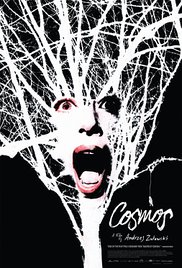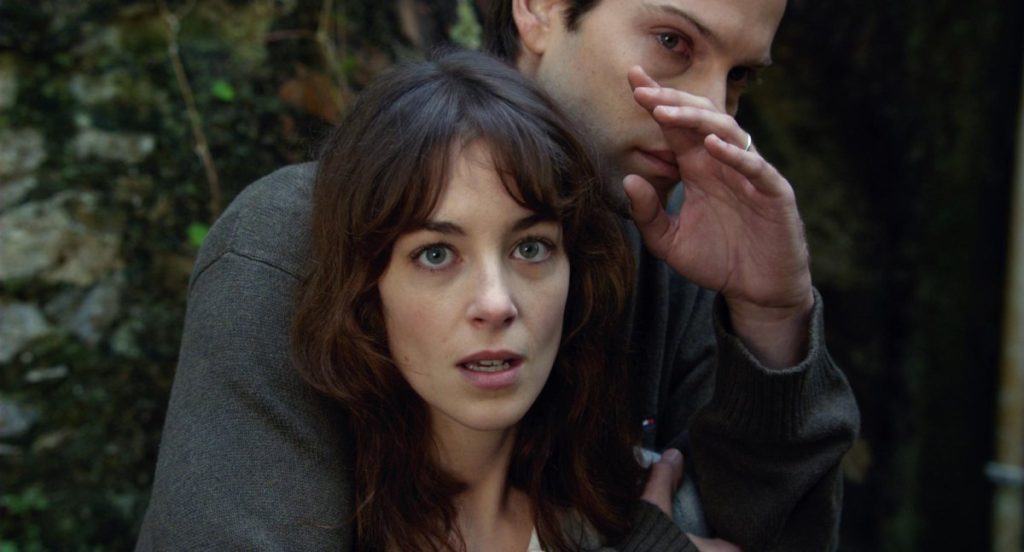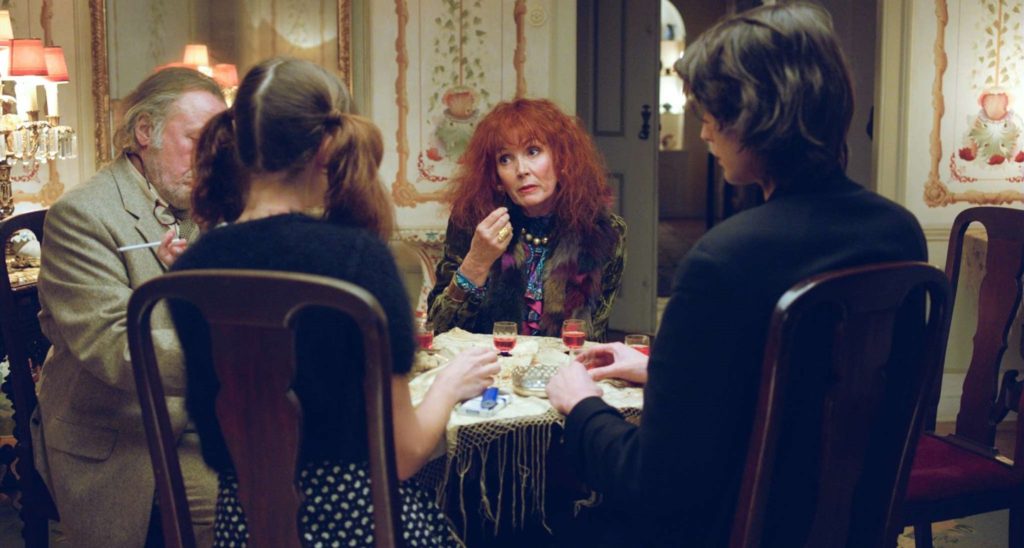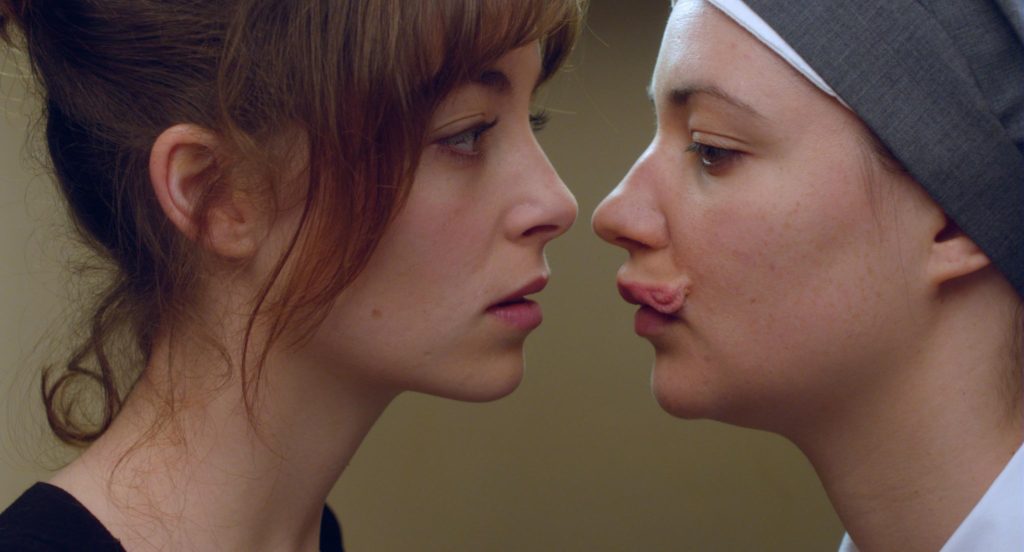DIRECTED BY ANDRZEJ ZULAWSKI/FRENCH/2016 (U.S. THEATRICAL PREMIERE)
STREET DATE: NOVEMBER 15, 2016/KINO LORBER
 Based on the 1964 book of the same name (actually “Kosmos” and described as “self-aware”, “psychological” and “absurdist”) by Witold Gombrowicz, Cosmos is a decidedly Earthbound character study of the warped variety. It has nothing to do with Carl Sagan, Neil deGrasse Tyson, or even astronomy. It is, in keeping with the description of its source material and more so than most films, its own thing. It is a thing to be experienced – if not by everyone.
Based on the 1964 book of the same name (actually “Kosmos” and described as “self-aware”, “psychological” and “absurdist”) by Witold Gombrowicz, Cosmos is a decidedly Earthbound character study of the warped variety. It has nothing to do with Carl Sagan, Neil deGrasse Tyson, or even astronomy. It is, in keeping with the description of its source material and more so than most films, its own thing. It is a thing to be experienced – if not by everyone.
The work of a certain few filmmakers, it’s safe to say, digest considerably better via proper contextualization. Bergman, Antonioni, Fellini, Kiarostami. Add to that list Polish filmmaker Andrzej Zulawski. With all of these artists, one is better knowing what one is getting into prior to wading blindly into, say, a later work. Or, in this case of Zulawski’s Cosmos, his final work.
Zulawski’s filmography, so we’re told via the informative bonus features on the blu-ray, is one of wild, continuous, evolving experimentation and unpredictability. Words like “mad”, “manic”, “untethered”, and “crazed” come up. So too, does “masterpiece”. The collective consensus seems to be that this is an effective summation of all of his prior on-screen work.
Cosmos is a strikingly unique work detailing a great white madness in the world today. It fixates on death in a crazed roundabout way through an aggressive display of aliveness.
I don’t doubt it. As an admitted Zulawski newbie, having never seen his most well known film, Possession (1981), nor his previously most recent one, 2000’s Fidelity, nor anything else he’s created, Cosmos came as surprise jolt. (Surprise or not, the film is a jolt either way). From it’s first moments, there is continuous movement and frenetic action within the frame. Some of it is comedic, much of it is sensory assaultive. The director’s obvious affinity for steadicam, gliding through space so effortlessly, coupled with his downright odd insert shots, cutaways and unexplained occurrences, wield the kind of cinematic energy many are simply afraid of. Zulawski‘s movie in question doesn’t so much play out as pulsate. So much so, one would never guess he’s dead.

It’s true; on February 17 of 2016, Andrzej Zulawski was claimed by cancer. He was seventy-five. Zulawski’s death went virtually unnoticed in the western hemisphere, despite everyone’s inability to resist yelling about how 2016 won’t stop taking from us, even then. Yet, hearing his career explained, his mark in filmdom is easily apparent. Working in both France and Poland making challenging and violent movies, Zulawski is credited for bringing the best work out of actresses Isabelle Adjani, Romy Schneider, and lover Sophie Marceau.
Cosmos, then, becomes a hair more comprehendible. But still, it’s a tough nut – probably even if you are a Zulawski veteran. It tells the tale of a young intellectual writer, Witold (played by a completely immersed Jonathan Genet, his character named after the author himself?), and his mental unraveling amid obsession, delusion and infatuation. He and his weirdly enabling gay traveling partner check into a claustrophobic bed and breakfast, run by a hysterically shrieking matriarch (Sabine Azéma) who’s prone to sudden, temporary paralysis.

Hiking the grounds, Witold comes upon recently hanged sparrows. (Creepy.) Sitting in his room, he’s troubled by a water damage wall stain that resembles a rake. (Ominous.) Yet he ignores an even more overt one, clearly resembling a vagina. He’s entranced with a beautiful young married woman (Victória Guerra) who wears bright red lipstick. Likewise, he’s put off by the young nun housemaid with a deformed upper lip. Lips, lips, lips, his unexplained hang-up. Is he a killer? If so, why? If not, why? As he obsessively types his own prose and spouts that of others, his flailing hair and wild eyes betray a hopeless case. He’s trying to make some sense of it all, but he can see it makes no sense at all.
Cosmos is a strikingly unique work detailing a great white madness in the world today. It fixates on death in a crazed roundabout way through an aggressive display of aliveness. Visually acute as it plays out in its rustic edge of the world, the film is a compelling in its fracturing repulsion.

Kino Lorber has set out to do right by Cosmos, and does so at every turn. A full package presentation worthy of Criterion, Cosmos on blu-ray boasts an immaculate visual transfer and immersive audio. The bonus features are numerous and all worthwhile. And frankly, greatly helpful. There’s a commentary track by Zulawski insider Daniel Bird, a visual essay by filmmaker David Cairns, a making-of featurette, footage of a film festival screening introduction, and a booklet with an essay by Glenn Kenny, and other odds and ends. The participants claim that Cosmos rewards repeat viewings. I’m not sure how soon I’ll test that, but I do appreciate that it all comes in a very attractive black plastic blu-ray case with striking artwork.
For bold explorers into the stranger ends of contemporary World Cinema, a trip into this Cosmos is one to take.
The images used in the review are present only as a reference to the film and are not meant to reflect the actual image quality of the Blu-ray.

